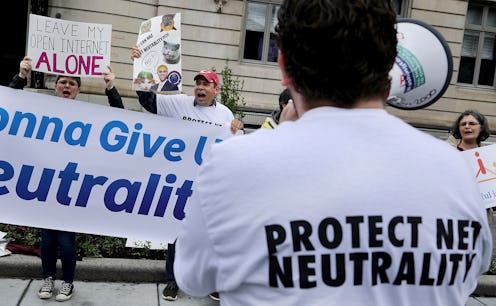News
How To Help Save Net Neutrality Before It’s Too Late

The words "net neutrality" still sound like a vague political concept that can't possibly have any impact on your life, but if you are a modern denizen of the internet, that couldn't be any farther from the truth. You'll definitely learn what it is if we lose it — so it's time to help save net neutrality and preserve equal access to everyone's favorite non-natural resource: the internet.
Getting rid of net neutrality has been on the Trump to-do list basically since he took office, because in some circles it's seen as a burdensome regulation. Basically, the net neutrality requirement means that internet service providers (ISPs) can't charge differently for different types of web traffic. No matter what website you go to, it will load at the same rate. This benefits the content providers over the ISPs — and that includes both huge providers, like Google and Netflix, and tiny ones, like the boutique pet supply shop down the street that wants to advertise its products.
Without this regulation, though, content providers lose out, and ISPs win big. They no longer have to treat all websites or apps the same, so some might automatically load more slowly if the content provider doesn't pay more to be included in the group that loads quickly. Consumers, on the other hand, could essentially have to choose "bundles" of websites and apps that they want to use, and then pay accordingly.
Imagine you're starting up a small business, and you want to start a website to help get the word out. With all of the capital you're putting into making your dream a reality, you don't have much to spare for advertising — and now your ISP is asking you to pay extra fees to have your website load fast. If you don't pay for a faster load time, then your website could take people back in time to the frustrating dark ages of dial up, which will actively drive people away from your product — because who, nowadays, doesn't judge a company based on its website? Without net neutrality, that could become a reality. This would also apply for customers, in reverse — if you don't have the money to pay for full service, you're simply not going to have access to the whole internet.
More troublingly, though, it could also mean that ISPs could essentially censor websites they didn't want their consumers to see. Whether it's a competitor's website or the website of a company whose owner's politics they don't agree with, the ISP would be able to block it or severely slow down the loading time. For an extreme case of this — which is thankfully far beyond anything that would ever happen in the U.S. — have a look at China's internet censorship rules.
If you don't like the idea of handing over more money every month to your ISP to get the same service that you're already getting, it's time to resist. Congress could block this move, but you're going to need to raise a huge fuss about it. Call your congresspeople — especially if they're Republican — and make sure that you're just as mad about this as you are about healthcare or tax reform.
The FCC seems pretty dead set on repealing net neutrality, but it still doesn't hurt to email the FCC commissioners with your thoughts. Between the two, though, definitely prioritize telling your congresspeople that you're angry about a potential net neutrality repeal, because assuming the FCC goes through with it, Congress is the only body left that can stop it from becoming a reality.
Republicans have made it clear that they prioritize big corporations above average Americans again and again, and this is yet more proof of that. This is one of the changes that could have the biggest effect on your everyday life, though — so you need to stand up and fight for net neutrality now.